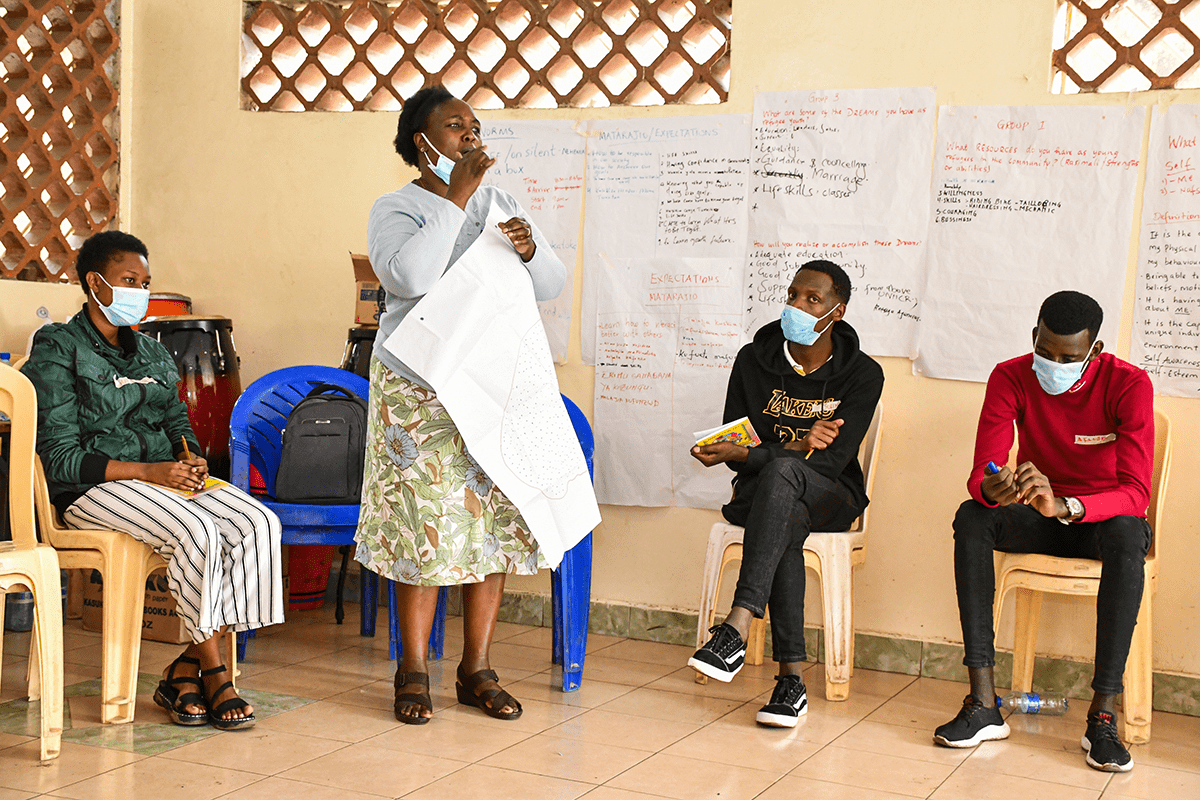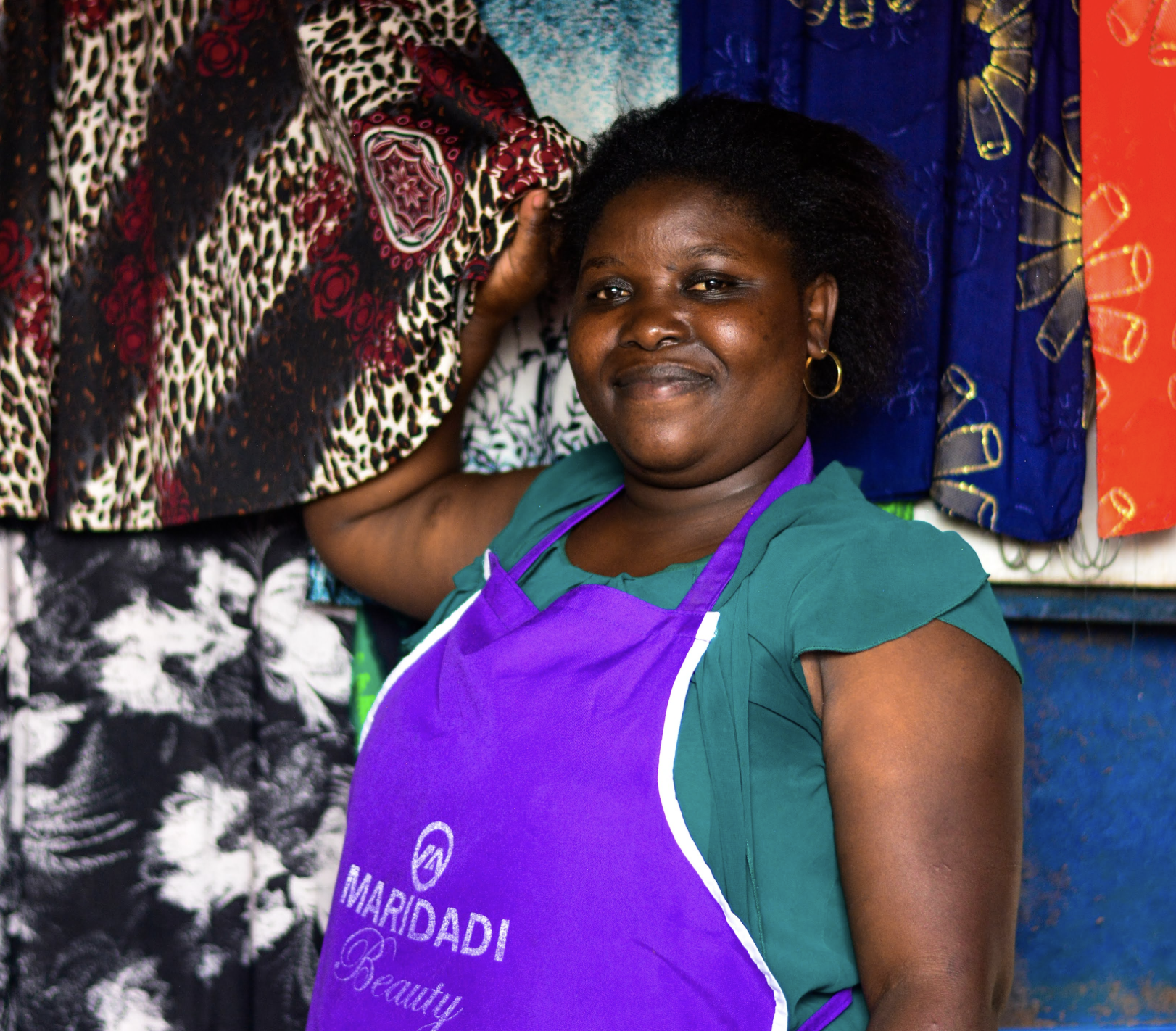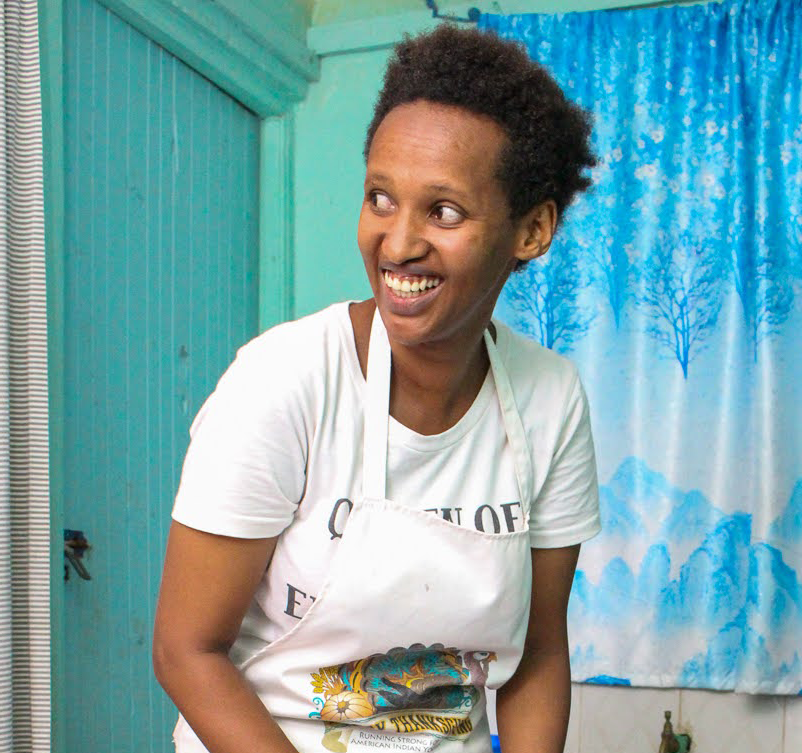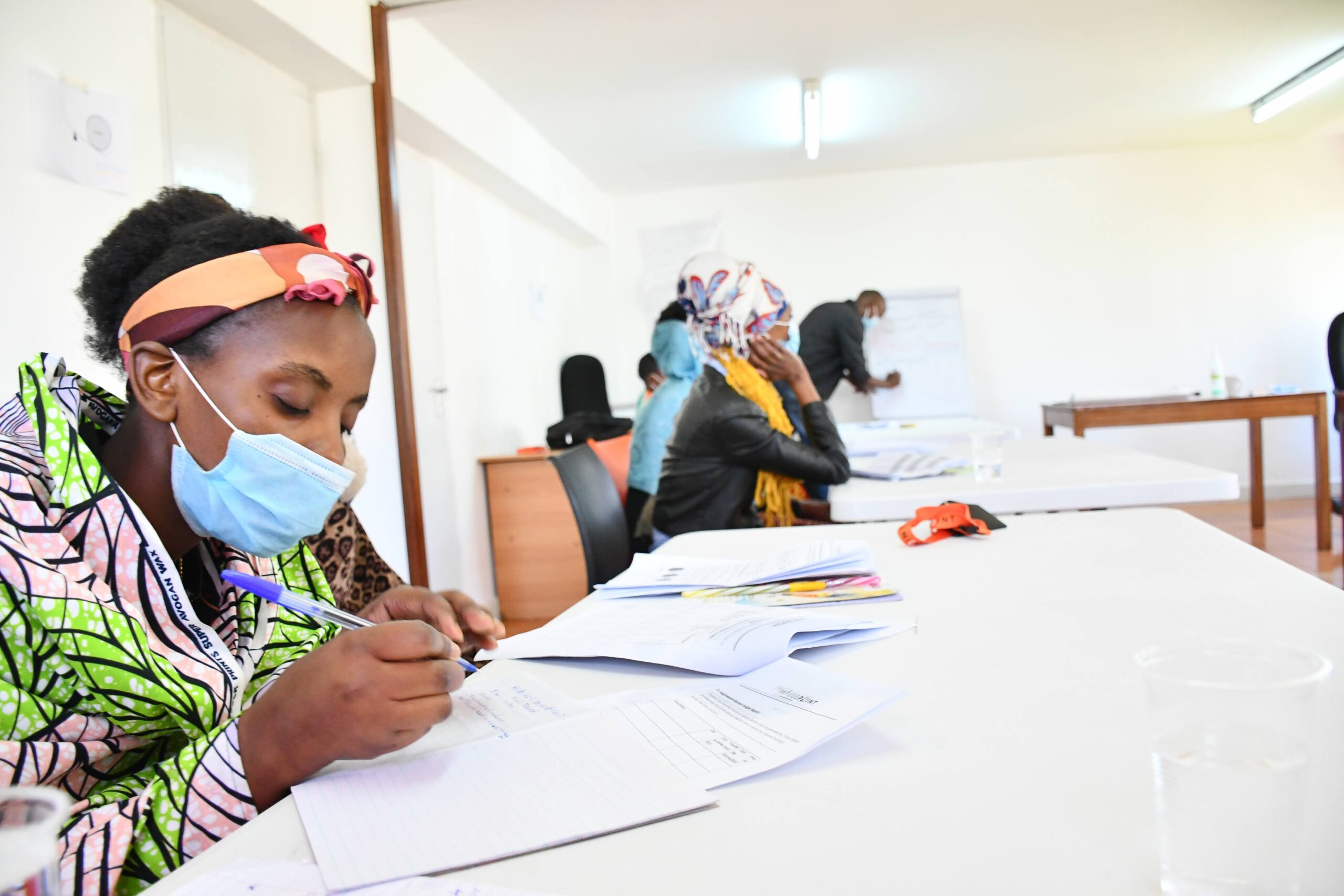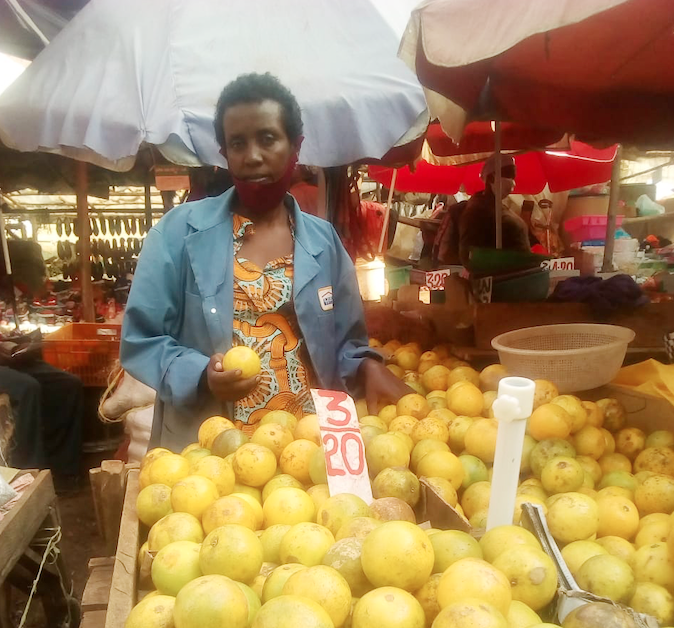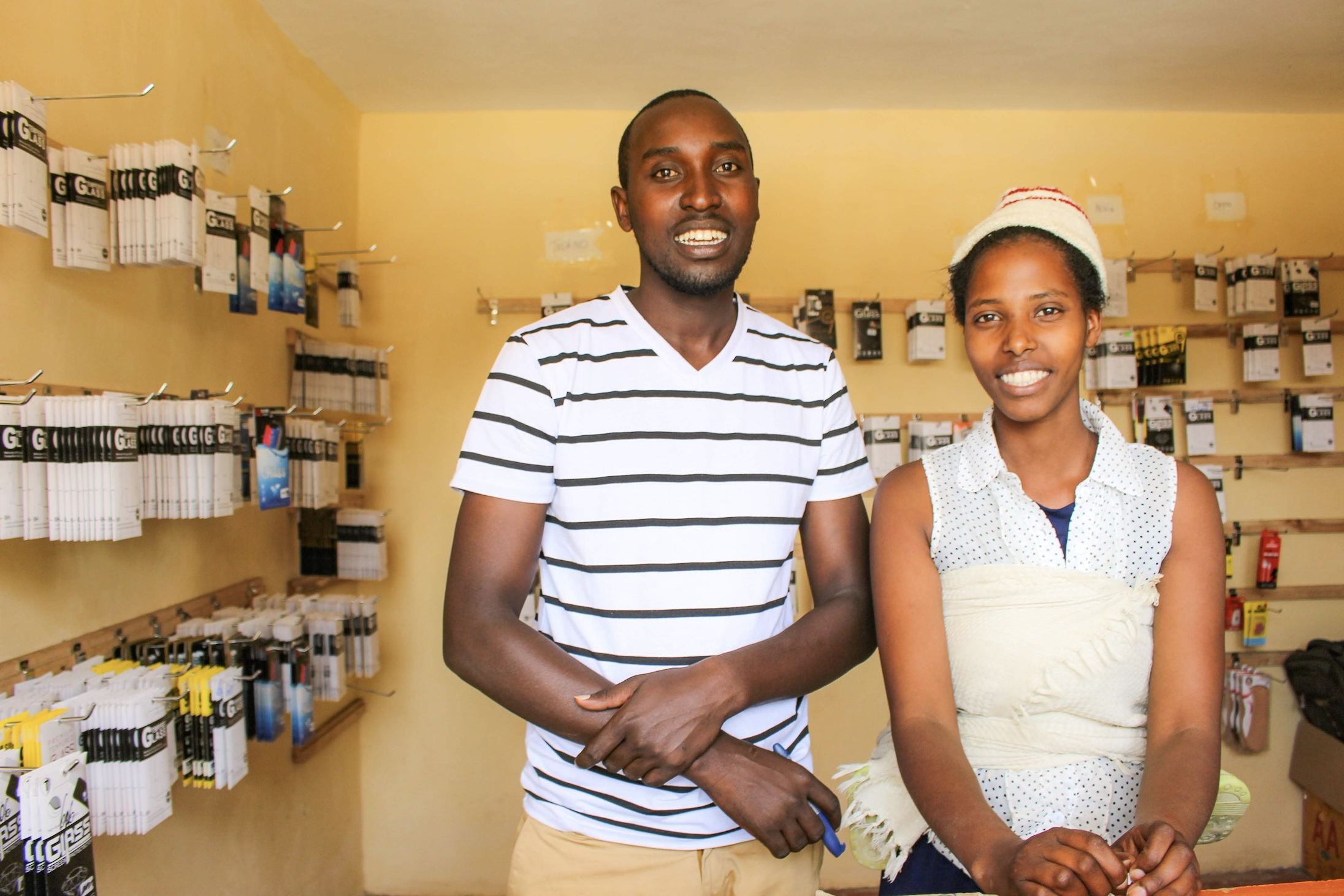
“I have always wanted to change my daughters’ name from Victorie Fredric to Victorie Fredric RefugePoint,” Fredric said, laughing hysterically. “I want to add RefugePoint to her name because if it wasn’t for RefugePoint I don’t know where she would be today. RefugePoint gave us food, rent, money to grow my business, and most importantly medical care for my daughter.”
In 2015, Fredric and his wife Dalia were forced to flee their home country of the Democratic Republic of Congo (DRC) due to inter-clan fighting. They sought safety in Nairobi, Kenya, and began to grow their family and had two children, Prince, age 4, and Victorie, age 2. From birth, Victorie experienced delayed developmental milestones. Despite her parents’ constant attempts to seek out services and medical care for her, Victorie was unable to sit up unassisted, unable to communicate, and would often cry. The family had lost hope that they could access the care that Victorie needed, and had no stable means of income.
Although Fredric had a small stock of phone accessories, he was not able to sell his products since he was spending so much time focusing on caring for his daughter. Carol, Fredric’s caseworker, worked with the family to develop a plan to support Victorie’s access to physiotherapy services and improve her nutrition status. At the same time, Carol worked with Fredric to develop a plan towards self-reliance.
“I learned about RefugePoint in 2018 when a friend of mine saw our child and informed us that there was an organization that could assist us. My wife then took our child and went to the RefugePoint office. At that time we were in a difficult place. Our daughter is two years old and she was very unwell at the time. Before she was born I was already doing business, selling phone accessories and chargers, but one month after her birth is when we began to notice that there was something wrong, and we started to take her to hospitals, all our savings and business capital went into her care. At the time my wife visited RefugePoint we didn’t even have food in our house. We had spent every waking moment taking her to different hospitals, so we had no income. RefugePoint immediately put us on food support for 9 months. They gave me training in business and an initial business grant of $200 in August 2018 to restart my business. RefugePoint also referred us to Kenyatta National Hospital so that our child could be seen by a specialist.”
Fredric’s business grew and by the end of the year his business was flourishing and he was making average monthly profits of $250. This was mostly through his hard work and determination. He would often travel out of Nairobi to cities almost 500 km away to the Coast region and Rift valley region to a niche market of clients in rural areas, unable to make trips to Nairobi to purchase their mobile phone accessories. With the profit he made he decided to open a small general shop for his wife. He was able to buy a bed, a gas stove, and a television set for the family. Meanwhile, his daughter’s health began to improve as she received nutrition care, referral for physiotherapy, and medical care through RefugePoint’s Health department. After a few months of medical intervention, the child was able to make physical movements, sit up unassisted, and make sounds to communicate. Dalia, her mother, was trained in community-based rehabilitation to do basic physiotherapy at the household level. In addition, their son Prince enrolled in an early childhood development school, and his school fees and uniform were paid for by RefugePoint. Dalia also attended group and individual counseling sessions to help her cope with caring for a child with a disability.
Fredric told us, “From the moment we began to receive assistance from RefugePoint, a lot of things in our lives have changed for me and my family. We were able to move from the small house we were living in, and now we live in a nice two-bedroom house. My daughter is getting better, my son is enrolled in school, and his school uniform was provided by RefugePoint. I thank RefugePoint, I thank my Case manager Carol and my Livelihoods manager Damaris. They held our hands, advised us, guided us, cared for me and my family. I know that we are loved by RefugePoint.”
Dalia also opened up to us and said: “I can now help others. If I see someone in need, without food, I can share a little bit of what I have, I can not let them sleep hungry if I have something I can share, because RefugePoint taught me about caring for others.”
Due to his great business acumen, we granted Fredric an additional $400 in June 2019, which enabled him to set up a physical shop to sell his goods. He has mentored many young men in his neighborhood on how to start and run their own mobile phone accessory businesses.
Just like the vast majority of refugee families, Fredric and Dalia are now struggling as a result of the impacts of the pandemic, but they are resilient. Due to low sales, they had to temporarily close their shop, but Fredric continues to travel to remote rural areas outside of Nairobi, where he has found a niche market in which to sell his mobile phone accessories. Dalia is also helping to support the family by selling watermelon in their neighborhood. Though Fredric and his family are now stable, their caseworker continues to engage with the household to follow-up on Victorie’s physiotherapy progress.

“I have always wanted to change my daughters’ name from Victorie Fredric to Victorie Fredric RefugePoint,” Fredric said, laughing hysterically. “I want to add RefugePoint to her name because if it wasn’t for RefugePoint I don’t know where she would be today. RefugePoint gave us food, rent, money to grow my business, and most importantly medical care for my daughter.”
In 2015, Fredric and his wife Dalia were forced to flee their home country of the Democratic Republic of Congo (DRC) due to inter-clan fighting. They sought safety in Nairobi, Kenya, and began to grow their family and had two children, Prince, age 4, and Victorie, age 2. From birth, Victorie experienced delayed developmental milestones. Despite her parents’ constant attempts to seek out services and medical care for her, Victorie was unable to sit up unassisted, unable to communicate, and would often cry. The family had lost hope that they could access the care that Victorie needed, and had no stable means of income.
Although Fredric had a small stock of phone accessories, he was not able to sell his products since he was spending so much time focusing on caring for his daughter. Carol, Fredric’s caseworker, worked with the family to develop a plan to support Victorie’s access to physiotherapy services and improve her nutrition status. At the same time, Carol worked with Fredric to develop a plan towards self-reliance.
“I learned about RefugePoint in 2018 when a friend of mine saw our child and informed us that there was an organization that could assist us. My wife then took our child and went to the RefugePoint office. At that time we were in a difficult place. Our daughter is two years old and she was very unwell at the time. Before she was born I was already doing business, selling phone accessories and chargers, but one month after her birth is when we began to notice that there was something wrong, and we started to take her to hospitals, all our savings and business capital went into her care. At the time my wife visited RefugePoint we didn’t even have food in our house. We had spent every waking moment taking her to different hospitals, so we had no income. RefugePoint immediately put us on food support for 9 months. They gave me training in business and an initial business grant of $200 in August 2018 to restart my business. RefugePoint also referred us to Kenyatta National Hospital so that our child could be seen by a specialist.”
Fredric’s business grew and by the end of the year his business was flourishing and he was making average monthly profits of $250. This was mostly through his hard work and determination. He would often travel out of Nairobi to cities almost 500 km away to the Coast region and Rift valley region to a niche market of clients in rural areas, unable to make trips to Nairobi to purchase their mobile phone accessories. With the profit he made he decided to open a small general shop for his wife. He was able to buy a bed, a gas stove, and a television set for the family. Meanwhile, his daughter’s health began to improve as she received nutrition care, referral for physiotherapy, and medical care through RefugePoint’s Health department. After a few months of medical intervention, the child was able to make physical movements, sit up unassisted, and make sounds to communicate. Dalia, her mother, was trained in community-based rehabilitation to do basic physiotherapy at the household level. In addition, their son Prince enrolled in an early childhood development school, and his school fees and uniform were paid for by RefugePoint. Dalia also attended group and individual counseling sessions to help her cope with caring for a child with a disability.
Fredric told us, “From the moment we began to receive assistance from RefugePoint, a lot of things in our lives have changed for me and my family. We were able to move from the small house we were living in, and now we live in a nice two-bedroom house. My daughter is getting better, my son is enrolled in school, and his school uniform was provided by RefugePoint. I thank RefugePoint, I thank my Case manager Carol and my Livelihoods manager Damaris. They held our hands, advised us, guided us, cared for me and my family. I know that we are loved by RefugePoint.”
Dalia also opened up to us and said: “I can now help others. If I see someone in need, without food, I can share a little bit of what I have, I can not let them sleep hungry if I have something I can share, because RefugePoint taught me about caring for others.”
Due to his great business acumen, we granted Fredric an additional $400 in June 2019, which enabled him to set up a physical shop to sell his goods. He has mentored many young men in his neighborhood on how to start and run their own mobile phone accessory businesses.
Just like the vast majority of refugee families, Fredric and Dalia are now struggling as a result of the impacts of the pandemic, but they are resilient. Due to low sales, they had to temporarily close their shop, but Fredric continues to travel to remote rural areas outside of Nairobi, where he has found a niche market in which to sell his mobile phone accessories. Dalia is also helping to support the family by selling watermelon in their neighborhood. Though Fredric and his family are now stable, their caseworker continues to engage with the household to follow-up on Victorie’s physiotherapy progress.
